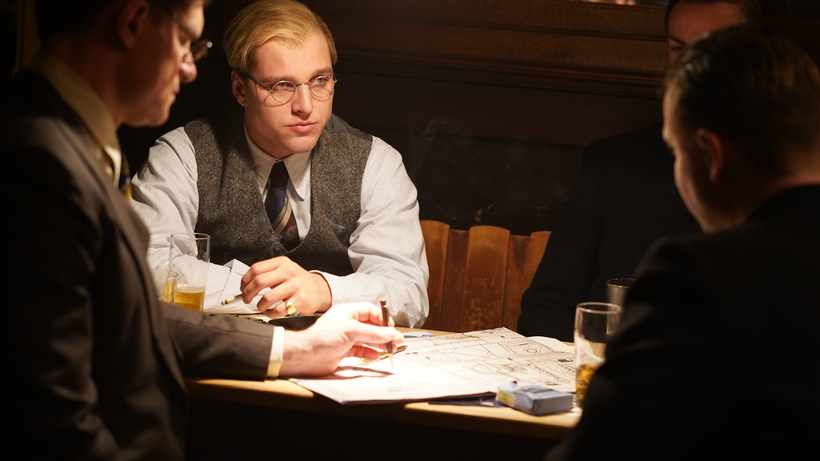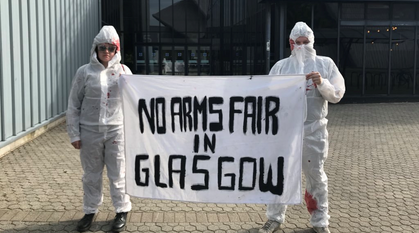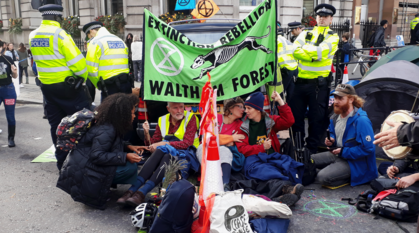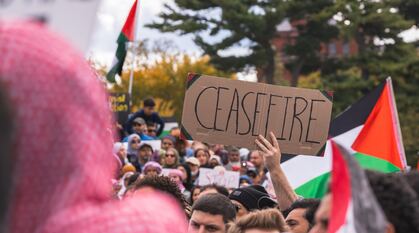Bonhoeffer and the challenge of pacifism
After watching the recently released Bonhoeffer film, Siobhán Haire explores the dilemmas of the pacifist stand and asks how we are called to challenge injustice.

As authoritarianism flourishes, and social divisions deepen, we face urgent questions about resisting oppression. How do we remain faithful to peace when confronted with evil? How do we balance a commitment to nonviolence with the responsibility to act?
I was recently invited to the UK premiere of Bonhoeffer, a film which explores the life of German theologian Dietrich Bonhoeffer, an anti-regime dissident in 1930s and 40s Germany. Bonhoeffer was a founding member of the Confessing Church, known for his vocal resistance to the Nazis and their escalating persecution of Jews.
Accused of being associated with a failed plot to assassinate Hitler, Bonhoeffer was hanged 80 years ago this month, on 9 April 1945, during the final days of the Nazi regime. His story raises difficult questions for us as Quakers, sharing as we do Bonhoeffer's commitment to justice but holding fast to our testimony of peace.
Learning from history
If this film had been released five years ago it would have been an uplifting story about an impressive man, but something we could have watched from a comfortable ethical distance.
Released in 2025, as the far right gains power in both Europe and the United States, people disappear into the US prison and immigration systems, Putin's critics die in remote Siberian prisons, women in the US and elsewhere face assaults on their bodily autonomy, the hostile environment shows little sign of abating in the UK, and the trans community faces vocal persecution, the film sounds a much more present warning.
It poses uncomfortable questions about what we might have to sacrifice to oppose fascism.
Engaging with others' struggles
One of the most striking elements of Bonhoeffer's life, and one that the film foregrounds, is his time spent in Harlem with the Abyssinian Baptist Church. Here, he encountered the reality of racial injustice in America, and his faith was reshaped by Black liberation theology.
This experience sharpened his awareness of systemic oppression and reinforced his commitment to active resistance.
For Quakers, this speaks to our own call to solidarity. Our history is full of those who have refused to stand idly by – whether in the abolition of slavery, the Kindertransport, or contemporary struggles for climate and social justice. Bonhoeffer's life compels us to ask: Whose suffering do we fail to see? How can we walk alongside those most impacted by injustice?
It is in this listening and learning that our response is shaped. We cannot act in isolation, nor can we be selective in our justice work. The film reminds us that Bonhoeffer's clarity about the Nazi threat came, in part, from his willingness to engage with others' struggles. Today, as marginalised communities face renewed attacks, we must ask ourselves: Where are we being called to stand?
Addressing controversies
The film has attracted some controversy, including allegations that it co-opts Bonhoeffer as a Christian nationalist. This is certainly a distortion of his theology, and I found it hard to discern a nationalist undertone in the film. In fact, the film seemed to emphasise Bonhoeffer's socialist and internationalist perspectives more than anything.
Nevertheless, in some quarters of the United States today, Bonhoeffer has been appropriated by Christian nationalists as a figure who justifies radical, even violent, resistance against what they perceive as an immoral society. This raises further questions about how we ensure that figures like Bonhoeffer are remembered accurately, rather than misused to justify oppression.
Bonhoeffer's opposition to the Nazi regime went beyond words; he became implicated in an assassination plot, a choice that stands in stark contrast to his theological commitments to peace. For Quakers, who have long upheld the peace testimony even in times of war, this presents a profound challenge. What do we do when faced with overwhelming wrongdoing?
A call to faithful action
Friends who later served in the Friends Ambulance Unit, and those who refused to do so, might recognise this dilemma. Some Friends today might feel drawn toward direct action that disrupts systems of oppression, even when it carries personal risk. Others may continue to hold fast to nonviolent resistance, trusting in its long-term power.
But none of us can remain neutral.
As the world faces renewed threats, we are called to reflect on what faithful action looks like today. Bonhoeffer's life reminds us that inaction is also a choice. He challenges us not to look away from the suffering around us, but to ask: What are we willing to sacrifice for justice?
Quaker faith is a living faith. It calls us not just to reject violence but to actively build peace, to challenge injustice, and to stand alongside the oppressed. In this moment, as the film urges, we must ask ourselves: What is God calling us to do?
If we are not asking these questions, we are not paying attention.


